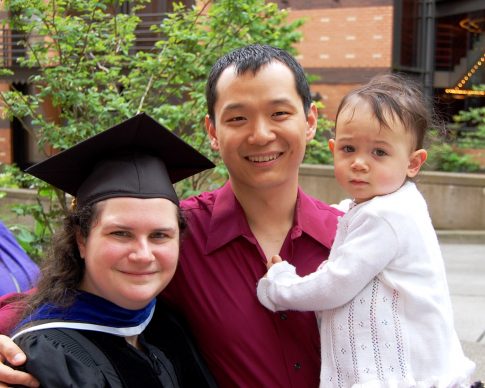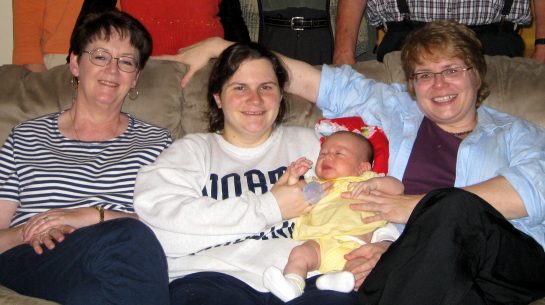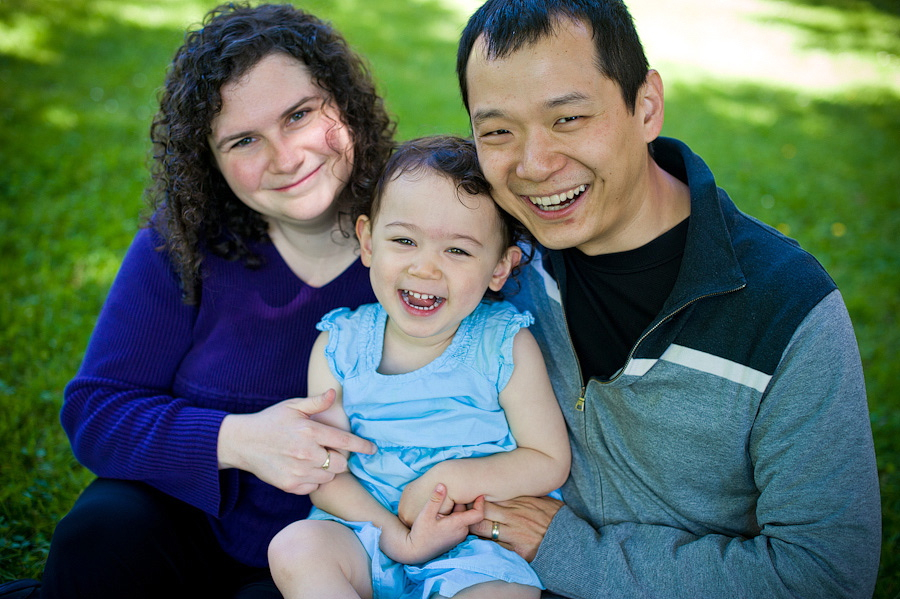Suzi Fei is a devout Mormon, wife, and mother. She’s also a computational biologist and an enthusiastic career woman who says her natural inclinations to pursue a profession often brought anxiety and loneliness while growing up in the Church. But her life changed when she met her biological parents, and Suzi began feeling more comfortable in her own skin. She encourages women to embrace their natural talents and spend more time trusting in God and less time worrying about cultural expectations.
Why do you say you were born a career woman, and when did you first sense that?
It was genetic, and I truly mean genetic. Not some undetermined mix of nature and nurture. Three days after I was born, LDS Family Services placed me in the arms of my wonderful adoptive parents, who are two of my very best friends today. My father is a gunsmithing instructor and business owner, and my mother stayed home to raise me and do bookkeeping for the business. I grew up in tiny rural West Coast towns—Janesville, California, and later Coquille, Oregon. It was a wonderful and loving home. Very Mormon. Very conservative. To their credit, my parents always encouraged me to be true to myself and follow my dreams. They never pressured me to be a certain way or do a certain thing. I suspect they learned early on that kind of parenting wasn’t going to fly with me. My dad is a free thinker, always challenging and questioning, always sincere and open. I’ve always appreciated that about him. He taught me to not be afraid to say what I want to say and do what I want to do.
When I was about ten, my family got our first computer and I discovered the thrill of computer programming. I still remember the day I figured out how to make the command line in WordPerfect print out graphics. I ran across the yard to my dad’s gun shop to show it off. That excitement hasn’t gone away even as the coding tasks have gotten more complex. In high school, a passionate science teacher encouraged me to take his biology course even though I was sure that computer scientists had no need for biology. I signed up, and over the next year I discovered the glory of the living cell—the precise structures of proteins that enable them to work together in complex networks to produce life as we know it. In college, I double majored in computer science and biochemistry. I now have a PhD in computational biology, and I spend my days analyzing genome data from kidney tumors, trying to figure out what went wrong to cause the cancer. I love my career. There’s nothing like waking up each morning excited to do something that’s fun, interesting, and makes the world a better place.

Several years ago, when I was halfway through graduate school, I got a call from LDS Family Services. “It looks like both you and your birth mother submitted letters to your file saying you’d like to meet. Are you still interested?” It had taken years for them to figure out that we had both submitted those letters, but yes, I was still interested. It’s tough wondering what lies in your genes when you spend all day studying how influential they are. So they gave me her name and email address, and I did the first thing any kid in my generation would do—I Googled her.
The first thing that came up was this picture of her that looked just like me. The title underneath her picture was Dr. Brooke Hemming, physical chemist at Environmental Protection Agency. I was so proud. Soon after, I sent a long email to my birth mom explaining what I was doing with my life, and she wrote back and told me about her life and how she had met my birth dad when they were both at Berkeley in the early 80s. It turns out that she studied chemistry at Berkeley and then got a PhD in physical chemistry from Stanford. She is now a senior scientist at the EPA doing policy work for air quality.
It was like finding myself and finally feeling whole. My birth mother was one of six children, four of which were chemists. Her father was a physicist. She introduced me to my birth father, a computer programmer who had worked on the world’s first Internet browser and written four books on programming. My career aspirations, even my choice of career, have been with me from the beginning, an integral part of me, coded in the DNA in every cell in my body.
Finding my birth parents and finding that we had so much in common answered a lot of open questions and helped me feel more confident and self-assured, in almost every aspect of my life. It explained so much of why I am who I am. Of course, I’m very happy about some of the things I got from them, such as my career desires and political leanings, but even the not-so-great things I’m glad I know now. Take, for example, the shape of my body. Now that I know how strongly genetic it is in my birth mother’s family, I’m much less likely to blame myself and my shortcomings for it, and I’m much more accepting of my body.
What did you talk about when you first met your birth mother?
My birth mom flew out to Portland, and I picked her up from the airport. I was nervous to meet her, but she reassured me that she just wanted me to be myself and do whatever felt natural and right. We ended up talking about science careers a lot. We also talked about things like our common health problems. It’s great to have someone like that in your life when you’ve gone for a quarter of a century with no clue what lies in your genes.
Have you kept in touch since then?
We email and Skype and talk on the phone fairly regularly. She lives on the opposite coast, so visits aren’t too frequent, but she’s been out here a few times, and we all went to her parents’ house in Utah for a family reunion shortly after I met her. They were thrilled to have me back in the family, and they were thrilled with the effect it had on my birth mom as well. My birth dad also lives on the East Coast, and I’ve visited him a few times when I’ve been out that way for conferences. We talk on the phone a couple times a year. He has two young daughters, and it’s been neat to find and get to know my half-sisters.
How did your adoptive parents react to all of this?
My adoptive parents were a lot less nervous than I was. They felt confident and secure because we have a good relationship. We have a bond and a history together that can never be removed or threatened.
What was your experience growing up a Mormon with this drive to be a career woman?
It was lonely. No one understood why I wanted a career so badly. Didn’t I know that a woman’s highest calling is to devote her life to raising her children? Didn’t I know that no other success can compensate for failure in the home? Didn’t I know that mothers are primarily responsible for the nurture of their children? Why would I want to waste my time doing something of little importance when I could be shaping the future generations?

Let’s just say I learned to be very grateful, inwardly and outwardly, for the “other circumstances may necessitate individual adaptation” clause in the Family Proclamation. I felt like it left a little room for women like me in the Church.
Fortunately, I had a string of excellent teachers who helped me feel smart and encouraged me to challenge myself. A caring seminary teacher with a heart of gold who encouraged me not to worry, because things have a way of working out as they should. An understanding father who respected women and praised readily, always telling me I should do this or that career when I grow up because I’m so good at it. A nurturing mother who taught me to be strong, a feminist in her own right (though she may never admit it), never interested in a career or the priesthood, but always interested in fair treatment.
What can we do to be more supportive and encouraging to women with interests in the sciences and having a career?
Can we please be a little more supportive of the girls and women who truly desire careers, as well as those who don’t but feel the need to work outside the home for any number of other valid reasons? Can we also please be a little more supportive of the men who are married to these women, whether they decide to have full-time careers or stay home some or all of the time to care for their children and home? Sometimes working outside the home really is the right choice for a mother. We need to trust each mother to know what’s best for herself and her family.
When possible, as young women leaders, don’t be afraid to showcase women who’ve made a diversity of choices, or who have very different lifestyles sometimes not by choice, but who are happy, productive, and at peace with their lives. Show that different things work best for different people, and emphasize that the only way to figure out the best path for you is to maintain a close relationship with Heavenly Father and not be afraid to ask Him open-ended questions. Sometimes, due to your unique talents and desires, He’ll guide you in a direction that may not look like everyone else’s, and that’s okay. He has a customized plan for each one of us. He’ll help us maximize our time on Earth if we trust Him and let Him.
I know many women who choose to stay home, and that is absolutely the right choice for them. I also know many women who choose to work outside the home, and that is absolutely the right choice for them as well. We all have different strengths and different temperaments. No woman wants to be put in a box and told she must do this and be this, or else she is failing to live up to her eternal potential. That leads to a toxic and depressing culture of comparison rampant with feelings of inadequacy. Instead we should be celebrating each other’s strengths and capitalizing on the breadth of wisdom, experiences, and talents we share amongst us. The Celestial Kingdom I envision is full of glorious diversity—many different types of beings doing many different types of things, all working and growing together in beautiful harmony.
It is such an important message to internalize: What is right for one isn’t necessarily what is right for everyone. There is a deep well of shared understanding when we stop judging and start listening to, learning from, and loving our fellow humans, especially the ones who are different from us. If we let go of judgment, we can begin to find the beauty that lies in diversity. Each person is a very unique individual. I know from living this life and having felt the support from Heavenly Father, that He has a customized plan for me that takes into account my desires, inclinations, talents, and abilities. He has a plan for me, and he supports me in it. And that applies to every single one of us; and it looks different for everyone because every person is unique.
How did you meet your husband? And how have you been able to balance family and work life?
I wish I hadn’t worried so much about dating. Ever since I was a kid, Heavenly Father has stepped in and brought miracles into my life, particularly miracles that have enabled and supported my career. When the time was right, He brought a hunky Chinese man into my life who had joined the Church when he was in college. An open-minded man whose parents and culture encourage women to become professionals. A kind-hearted man who never exercises unrighteous dominion and equally shares family leadership, child nurturing, and domestic responsibilities. A humble man who is proud of me, and who knows, as I do, that I am accomplishing what I was meant to accomplish. Together, we are active and devout members of the Church who adore our religion because of the truth it contains, the millions of ways it enriches our lives, and the endless opportunities it gives us to make the world a better place.
We now have a bright and beautiful four-year-old daughter. I wish I’d listened when people said, “Don’t worry, you’ll like your own children,” because it’s true. I love her so much and think she’s the smartest, cutest kid in the universe. I am fiercely devoted to her, and I make whatever sacrifice is required to ensure she’s receiving the nurturing she needs. That love and devotion, however, have not turned me into a stay-at-home-mom. The striking restoration of sanity I experienced when my twelve-week maternity leave ended dispelled any lingering doubts. To maintain my mental health, I need to feel in control of my time at least part of each week. Caring for children doesn’t allow that, but my chosen career does. The 24/7 mom thing never has been and never will be for me. My temperament just isn’t well suited to it. When I am at work, my daughter spends her days in a warm and caring environment, and she is growing up to be a confident and independent child. I know with certainty that this lifestyle is what is best for our family, including my daughter. This is healthier for her than having an unhappy stay-at-home-mom, which allows me to let go of any guilt that may come my way.
How has your faith helped you make life decisions with career and family?
My faith has taught me that I have a Father in Heaven who loves me and who hears and answers my prayers. I do feel like I receive answers to prayers, and that is the foundation of my testimony. As a scientist, of course, I am constantly questioning. I’m not one of those people who can stand up and say “I know it’s true”—I don’t know any real scientist who can stand up and say “I know” much of anything—but I do believe in and have faith in God, a God with whom I can have close relationship when I put forth the effort. Answers to prayers have guided many of the decisions I’ve made in my life. I appreciate the example of Joseph Smith in the grove of trees asking God what to do; I think that idea of having a relationship with Heavenly Father permeates our religion. I don’t think we have a corner on it; other religions do it as well, they just call it different things, like meditation or looking within, and I think the Holy Ghost is speaking to them, as well. I just really like how we teach our kids to seek answers by taking time to study, pray, and ponder in order to develop that spiritual awareness.
Are there any books, music, art or other source of inspiration that’s had a profound influence on you?
When I was in AP Biology as a senior in high school, I read “Of Heaven and Earth: Reconciling Scientific Thought With LDS Theology.” I ate it up. Without it, I think I would have come to a place where I felt the need to choose between science and religion. It helped me through my faith crisis a year later when I read some things church leaders had said about evolution. I ultimately decided that I wanted to have faith and be a believing Mormon, because of the abundant goodness I found here and because it enriched my life and made me happier. However, in order for it to work for me, I needed to be able to dismiss some things, such as statements that ask me to reject scientific truth, or scriptural interpretations that are too literal, or even simply teachings that just don’t feel right. That book, along with my parents’ examples, allowed me to have the flexibility to do that, and it was necessary in order for me to be able to stay.
As Robert Kirby [humor columnist for the Salt Lake Tribune] says, “It took a long time to figure out that faith is a deeply personal matter, and I could drive myself nuts trying to fit someone else’s circus under my tent. So I stopped.” Thankfully, I live in a place where that hasn’t been an issue—I have always felt loved and accepted into the wards I’ve attended and have had abundant opportunities to serve, teach, and lead.
At A Glance
Suzi Fei
 Location: Portland, OR
Location: Portland, OR
Age: 32
Marital status: Married
Children: One daughter (4), a son on the way
Occupation: Computational biology scientist, currently a postdoctoral researcher studying cancer genomes
Schools Attended: Oregon State University; Oregon Health & Sciences University; PhD in Biomedical Informatics (computational biology emphasis)
Languages Spoken at Home: : English (everyone), Mandarin Chinese (husband and daughter)
Favorite Hymn: “Master, The Tempest is Raging”
On The Web: http://mormon.org/me/5DT1/Suzi
Interview by Kathryn Peterson. Photos used with permission.
At A Glance

